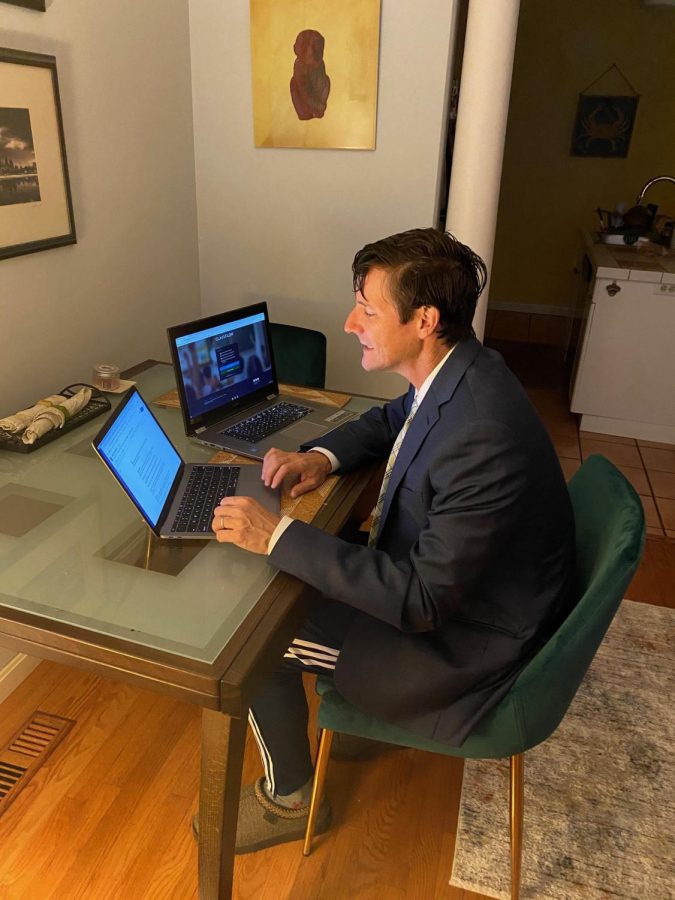Distance Learning: Teacher’s Edition
Mr. White, shown here in his teaching space at home, has found virtual teaching to be a difficult endeavor that takes a significant amount of planning.
September 22, 2020
Distance learning has made its way onto screens across the country. Every day, teachers present lessons and assignments on live video sessions from home to millions of students. They battle through unstable connections and audio glitches everyday, determined to get through the day and, perhaps even the entire school year.
Several PB teachers have shared their experiences with virtual schooling over these first four weeks of school, and have also offered words of advice and encouragement to help their fellow teachers and their students prosper in this new environment.
Mrs. Wheeler teaches Geometry and two year Algebra 2 classes.
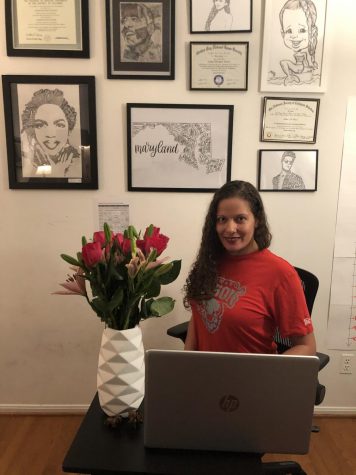
Mr. DeGroff teaches Honors English 10 and Television Production classes.
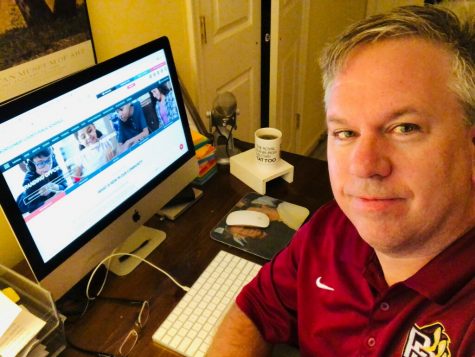
Ms. Miller teaches Honors Spanish 4 and AP Spanish Language and Culture.
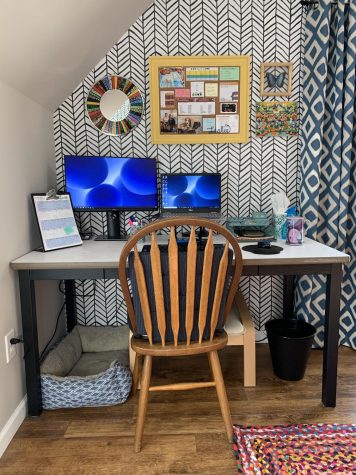
Dr. Stevens teaches Environmental Science, Biology, and Honors Physics.
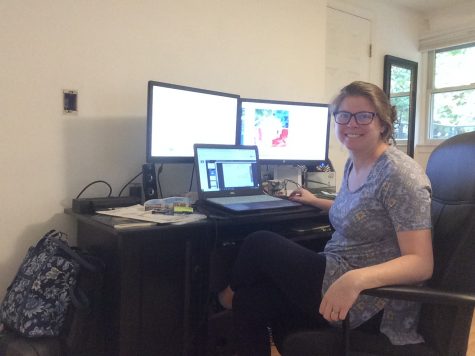
Q: How have these first 2 weeks of virtual schooling gone for you? Any surprises?
Mr. White: It was pretty difficult, a lot of planning involved. Colleagues have children that they’re wrestling but the real pleasantness of it is that we got to see the kids again at least, virtually. I think for almost all of us, the reason that we teach is because we like working with students. The students have been really good about chit-chatting and trying to make us feel like we’re back in the building, even though it’s not the same. The students definitely seem like they’re ready to do some work and try some new things, which is really nice so that’s been a pleasant surprise. The kids have been really willing to take risks and try new things in this virtual world.
Mrs. Wheeler: I’m enjoying virtual learning so far. I’m surprised that students are going to the correct class, since we are new to A and B days.
Mr. DeGroff: The first few weeks have gone surprisingly well overall. Students seemed to be hungry for the interaction (if not always the work), and a large percentage have expressed their desire to be back in the building when it is safe to return.
Ms. Miller: Honestly? The first two weeks of virtual schooling were some of the most challenging weeks of my career. First, there are always a million different tasks to juggle at the beginning of each school year, but this year it felt like every piece was new, and the rules on how/what/when we could teach kept changing! Second, the best part of being a teacher is getting to work with students…and talking to yourself while staring at a Zoom class full of black rectangles is so disheartening. On top of everything else, educators are being bashed in the media a lot lately; there are groups of people who think that teachers are being lazy because we don’t want to go back to school in person. In reality, every teacher I know is working TWICE as hard as we usually do! I don’t know a single teacher who got through the first two weeks of school without breaking down in tears at least once. It’s been really difficult.
Fortunately, things are slowly getting a little better. More and more students are keeping their cameras on and participating in class, and I’m starting to get faster with some of the tech, so lesson planning is getting a little easier. Also, clubs are starting up soon, so I’ll get to spend more time with my students in non-academic settings.
Dr. Stevens: They were very overwhelming. Between learning new technology and trying to put everything in our digital space in a user friendly way for students, it has been a huge undertaking. There have been many surprises with expectations and guidelines and I feel like we are chasing a moving target!
Q: How has virtual teaching been a challenge to your lesson plans and teaching goals especially being in your discipline?
Mr. White: It’s tricky, I think, because we like to have conversations about the world around us. Obviously there’s a lot of issues on the table with regards to social justice, an election, global pandemic, and so, having big discussions are really hard in a virtual world. People mute themselves and they feel uncomfortable just speaking up because they don’t want to try and screw up the whole conversation. That makes it kind of challenging so we’ve tried to find other ways to get kids to talk about these issues through using the chat or having students post videos or things like that [on Nearpod and Flipgrid]. [These options] have been helpful but we definitely miss the feeling of a real discussion in the Social Studies department because that’s really why students like social studies – we talk about issues often that are close to home.
Mrs. Wheeler: [This] has changed the way I teach because everyone has technology now. I have spent numerous hours creating activities on my new favorite platform, Desmos, to make many interactive lessons. I love how I can see every student’s graph at the same time versus previously having to walk around to each student’s desks to check correctness.
Mr. DeGroff: The biggest challenge for me has been the reality of not all being in the same space. The dynamics are inherently different and the relationship building with my students is going to be a much slower process via Zoom. Additionally, English relies heavily on reading and writing; while it’s still possible to do all of those things, doing them electronically is strange for most of us.
Ms. Miller: On a technical level, getting so many pieces of technology to work, often simultaneously, takes A LOT of brainpower and multitasking. On a pedagogical level, we are all trying to find the right balance between curriculum and mental health. It’s so important to us as human beings that we feel part of a community, and that’s a lot harder to do when we’re not all in the same room at the same time. I think this is especially crucial in a World Language classroom, because speaking is a huge part of the learning that we do, and so is making mistakes! It’s difficult to facilitate those kinds of learning opportunities when your students turn off their cameras and microphones as soon as they get into a breakout room on Zoom!
Dr. Stevens: It’s been very difficult finding virtual labs and experiences to enhance learning. A lot of the “good stuff” out there is not compatible with chromebooks. It’s also been challenging predicting what will work with a student chromebook since I do not have access to one to double check. Also, giving grace during this period of time [is important]. It’s important to keep high expectations, but not at the cost of students’ anxiety and fears about online learning when I do not know what type of home environment students are trying to learn from.
Q: What is one short piece of advice you have for students (and even teachers if you would like) to succeed in or just get through this new format?
Mr. White: Wear a mask everywhere you go. You know, be safe, wash your hands, those kinds of things. That’s the only way we’re gonna beat this. The other advice I would offer to the students is just take a breath. This is a challenge, we [teachers] know it, and the teachers are there for you. If you just want to take a breath, get your brain together [then] reach out to your teachers. We’re there for you, the school is there for you, and we know this is really tough. We’ll work with you however we can to try and make this work.
Mrs. Wheeler: Students should use the same strategies from in person learning to be successful online. Make sure you go to class on time, do your homework nightly, and visit your teachers during virtual office hours when you don’t understand.
Mr. DeGroff: The best things that I can offer are to look after your health and safety, because without those learning is nearly impossible. It’s also good to remember that none of us have ever experienced anything like this before and that everyone is under some level of additional stress whether they realize it or not. With that in mind, extra measures of patience and kindness will be very valuable.
Ms. Miller: ASK FOR HELP! I never would have made it through the beginning of the school year without group texts with my teacher friends. We swap tech tips, vent frustrations, or send pictures of our pets and ridiculous gifs to keep each other laughing. At a time when we have to be apart, it’s more important than ever that we stay together.
Dr. Stevens: Stay organized! In short, the more organized you are, the better you can keep up with your due dates and deadlines. Technology issues happen; it’s planning a buffer of time to deal with them that will be key!







































